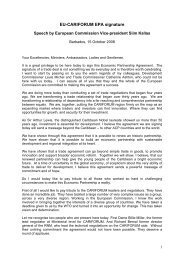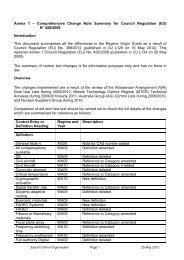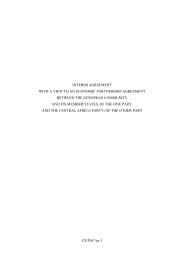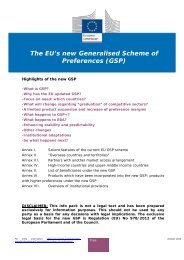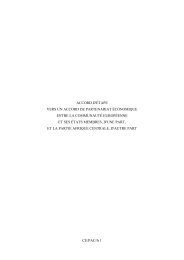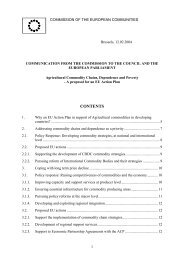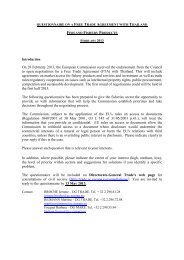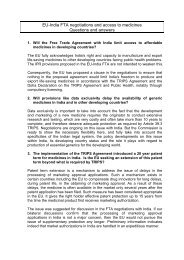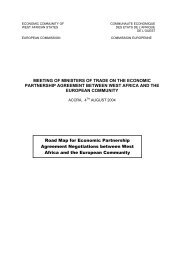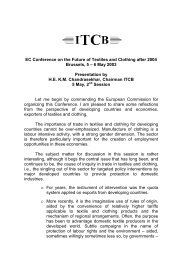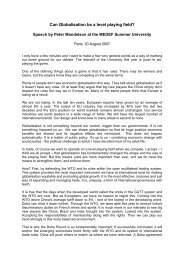Report on the Implementation of the derogation to ... - Trade Websites
Report on the Implementation of the derogation to ... - Trade Websites
Report on the Implementation of the derogation to ... - Trade Websites
Create successful ePaper yourself
Turn your PDF publications into a flip-book with our unique Google optimized e-Paper software.
Final <str<strong>on</strong>g>Report</str<strong>on</strong>g><br />
RoO Derogati<strong>on</strong> under <strong>the</strong> PACP-IEPA<br />
Italy), largely since <strong>the</strong> types <strong>of</strong> canned tuna products currently processed in PNG (i.e. basic skipjack<br />
in vegetable oil or brine in 180 g packs) do not interact substantially with <strong>the</strong> types produced within<br />
Italy and Spain for <strong>the</strong>ir major markets <strong>of</strong> Italy and Spain (i.e. high quality yellowfin in olive oil in<br />
small packs). Given that Philippines-based processors are <strong>the</strong> principal source <strong>of</strong> investment in PNG,<br />
and that <strong>the</strong>se companies have not penetrated <strong>the</strong> Italian or Spanish markets in <strong>the</strong>ir three decades<br />
<strong>of</strong> operati<strong>on</strong>s in <strong>the</strong> Philippines ei<strong>the</strong>r, it is highly unlikely that this will change in <strong>the</strong> far more<br />
challenging business envir<strong>on</strong>ment <strong>of</strong> PNG.<br />
It seems that <strong>the</strong> most important immediate strategic c<strong>on</strong>cern <strong>of</strong> EU-based processors is that global<br />
sourcing will be treated as a precedent ra<strong>the</strong>r than as an exempti<strong>on</strong> and be <strong>of</strong>fered <strong>to</strong> o<strong>the</strong>r trading<br />
partners, such as in free trade agreement negotiati<strong>on</strong>s with major canned tuna processors in ASEAN.<br />
In <strong>the</strong> medium-term, without <strong>the</strong> purchase <strong>of</strong> a major brand, PNG’s lack <strong>of</strong> direct penetrati<strong>on</strong> <strong>of</strong><br />
Italian and Spanish markets is very unlikely <strong>to</strong> change. If <strong>the</strong>re are plans for intra-EU growth by<br />
Spanish n<strong>on</strong>-branded exporters, <strong>the</strong>y may deepen interacti<strong>on</strong>s with PNG exports, possibly in <strong>the</strong><br />
French market. However, Italy- and Spain-based processors may develop a symbiosis with PNG<br />
through <strong>the</strong> increased import <strong>of</strong> loins.<br />
Third countries and <strong>the</strong>ir EU canned tuna markets<br />
Thailand, Philippines, Ecuador, Mauritius and Seychelles have c<strong>on</strong>sistently been leading third country<br />
suppliers <strong>of</strong> canned tuna and cooked loins <strong>to</strong> <strong>the</strong> EU market throughout <strong>the</strong> last decade. To date,<br />
PNG’s RoO derogati<strong>on</strong> has not had any direct impact <strong>on</strong> third country exports <strong>to</strong> <strong>the</strong> extra-EU<br />
market, given <strong>the</strong> derogati<strong>on</strong> has barely been utilised. Similarly, <strong>the</strong> derogati<strong>on</strong> cannot explain shifts<br />
in PNG’s share <strong>of</strong> EU markets for canned tuna and tuna loins. Nei<strong>the</strong>r <strong>the</strong> data for relative PNG<br />
share <strong>of</strong> <strong>the</strong> EU canned tuna market, nor that for <strong>the</strong> loin market show any discernable trends in <strong>the</strong><br />
‘post-derogati<strong>on</strong>’ period (March 2008-2011).<br />
For extra-EU imports <strong>of</strong> canned tuna, <strong>the</strong> <strong>to</strong>p-5 third countries have dominated <strong>the</strong> market for <strong>the</strong> 7<br />
year period running up <strong>to</strong> <strong>the</strong> derogati<strong>on</strong> (2001-06) and afterwards. PNG has remained a relatively<br />
insignificant player throughout. In fact, PNG’s largest recorded volume share <strong>of</strong> <strong>the</strong> extra-EU canned<br />
tuna import market was before <strong>the</strong> derogati<strong>on</strong> (i.e. 4.5%. in 2005). The market share <strong>of</strong> <strong>the</strong> leading<br />
third country supplier in that year (Ecuador) was 3.4 times higher than PNG’s. For PNG volume share<br />
<strong>of</strong> <strong>the</strong> extra-EU import market for tuna loins <strong>the</strong>re was a minor increase in <strong>the</strong> post-derogati<strong>on</strong><br />
period when it hit a new height <strong>of</strong> 2.4% in 2010, but <strong>the</strong>re is no discernable trend in <strong>the</strong> data. This<br />
share is, however, insignificant compared <strong>to</strong> that <strong>of</strong> <strong>the</strong> <strong>to</strong>p-3 leading third country suppliers in 2010<br />
(i.e. Ecuador with 35.6%, Mauritius with 12.0%, and Thailand with 11.6%).<br />
Raw material diversi<strong>on</strong> <strong>of</strong> tuna catch in <strong>the</strong> WCPO from third country processors relying <strong>on</strong> this<br />
supply <strong>to</strong> PNG-based processors is <strong>on</strong>e potential impact <strong>on</strong> third country suppliers identified for <strong>the</strong><br />
medium term. By 2016, PNG processors may require an additi<strong>on</strong>al 120,000 mt <strong>of</strong> raw material. The<br />
main third countries that will likely be impacted will be processors in Thailand, Philippines, Vietnam<br />
and China. There are no likely raw material diversi<strong>on</strong> impacts <strong>on</strong> EU-based processors, or o<strong>the</strong>r IEPA<br />
(i.e. Indian Ocean based processors) and GSP+ (i.e. Latin American) third countries.<br />
<strong>Trade</strong> diversi<strong>on</strong> <strong>of</strong> finished product, where increased PNG exports <strong>of</strong> duty free canned tuna and tuna<br />
loins <strong>to</strong> <strong>the</strong> EU market will displace market share <strong>of</strong> existing exporters, has been identified as<br />
ano<strong>the</strong>r potential impact <strong>on</strong> third country tuna processors.<br />
If <strong>the</strong> EU market remains relatively stagnant, by 2016 PNG could capture up <strong>to</strong> 14.0% share <strong>of</strong> <strong>the</strong><br />
extra-EU import market for canned tuna (from 4.3% in 2010), potentially exporting around 56,700<br />
Linpico s.a.r.l. Page 6




